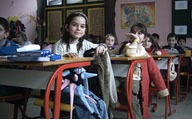
Empowering Communities Through Democratic Mechanisms
In recent decades, conflicts have fractured Serbian society along ethnic and religious lines. After Slobodan Milosevic’s arrest for war crimes in 2001, Serbia faced the daunting task of rebuilding a prosperous, democratic society in a region characterized by violence and ethnic tension. The Community Revitalization through Democratic Action (CRDA) program was designed to help heal these wounds and rebuild Serbian society.
CRDA was a 6-year, $40 million initiative funded by the U.S. Agency for International Development (USAID). The program developed democratic mechanisms that promoted community involvement in identifying and addressing economic and social needs in central Serbia. ACDI/VOCA and its partners, Overseas Strategic Consulting, Ltd. and the Urban Institute, created and strengthened community boards that designed and implemented local development projects. CRDA projects facilitated citizen participation in decision making while strengthening linkages across communities and promoting reconciliation among different ethnic and religious groups.
By the project’s end in 2007, CRDA completed 967 community projects, disbursed $50 million in community grants and raised $12 million in community contributions. The program operated in all of central Serbia’s 22 municipalities through 77 community boards. It involved the design, implementation and monitoring of projects that revitalized essential infrastructure, created income-generating opportunities, and addressed critical environmental and social problems. Over 350 women and 49 refugees were part of the 906 directly elected board members, who were active in project identification, design and selection. In addition, there were 1,000 working groups staffed by over 6,000 volunteers.
CRDA started with infrastructure, environmental and civic action programs, but by the end focused almost exclusively on income-generating activities. ACDI/VOCA approved 1,419 microgrants for local unemployed internally displaced persons and refugee grant recipients, creating 2,260 new jobs. The microgrant program was very popular with both beneficiaries and local government. The municipality of Kragujevac invested $80,000 to expand ACDI/VOCA’s program, and the municipality of Cacak expressed interest in implementing the same program in the area.
Each community project began by soliciting public input. Town hall meetings served as venues where citizens gathered to identify and prioritize local problems and selected community board members to represent them. Community boards drew previously marginalized and vulnerable groups, such as ethnic minorities, women, youth and the disabled, into community action. Community boards also included at least one member of the local government so that there was an opportunity to integrate projects into the government’s long-term development plan.
After the formation of the boards, ACDI/VOCA provided training in a wide range of subjects, including project planning, financial monitoring and media relations. Media training was particularly important because it promotes dialogue between the board and the community. This enhanced community ownership of each project and allowed for wider participation.
The boards designed community development projects and submitted detailed proposals and budgets to ACDI/VOCA for review. If the proposal met established technical and financial criteria, ACDI/VOCA hired local contractors and nongovernmental organizations to help implement the project. Communities contributed a minimum of 25 percent of the total cost of each project, either through cash or in-kind donations, further solidifying their involvement in and ownership of the project.
The following are a few examples of CRDA activities:
- implemented a $2 million job creation program in 11 central municipalities
- invested over $600,000 in updating medical equipment for better reproductive health care
- reconstructed electrical network in rural Ljig
- constructed markets in two areas
- upgraded educational resources and refurbished school facilities
- established and equipped rural agribusiness development centers
- repaved local roads and constructed bridges
- installed wastewater collector pipelines and electrical distribution lines
- distributed sour apple seedlings to local cooperatives
After CRDA demonstrated its ability to disburse funds efficiently to groups in need, USAID further extended the program into several more areas such as reproductive health, family planning and economic rehabilitation for internally displaced persons. These new facets dramatically broadened the reach of the CRDA project. For example, CRDA created teams of peer educators to reach out to youths in schools with information stressing the importance of reproductive health and family planning. As a result, over 200 students joined 20 youth task force teams that designed and implemented community health and education projects.
The legacy of the CRDA program will continue through the empowerment of communities, and the improved skills and livelihoods of entrepreneurs, refugees and young people that it has directly and indirectly touched. Community boards, youth groups, small businesses, and trained and empowered individuals have accepted the assistance provided to them by ACDI/VOCA and used it productively to improve their lives and the lives of those around them.
PDF version of profile (569 KB).





